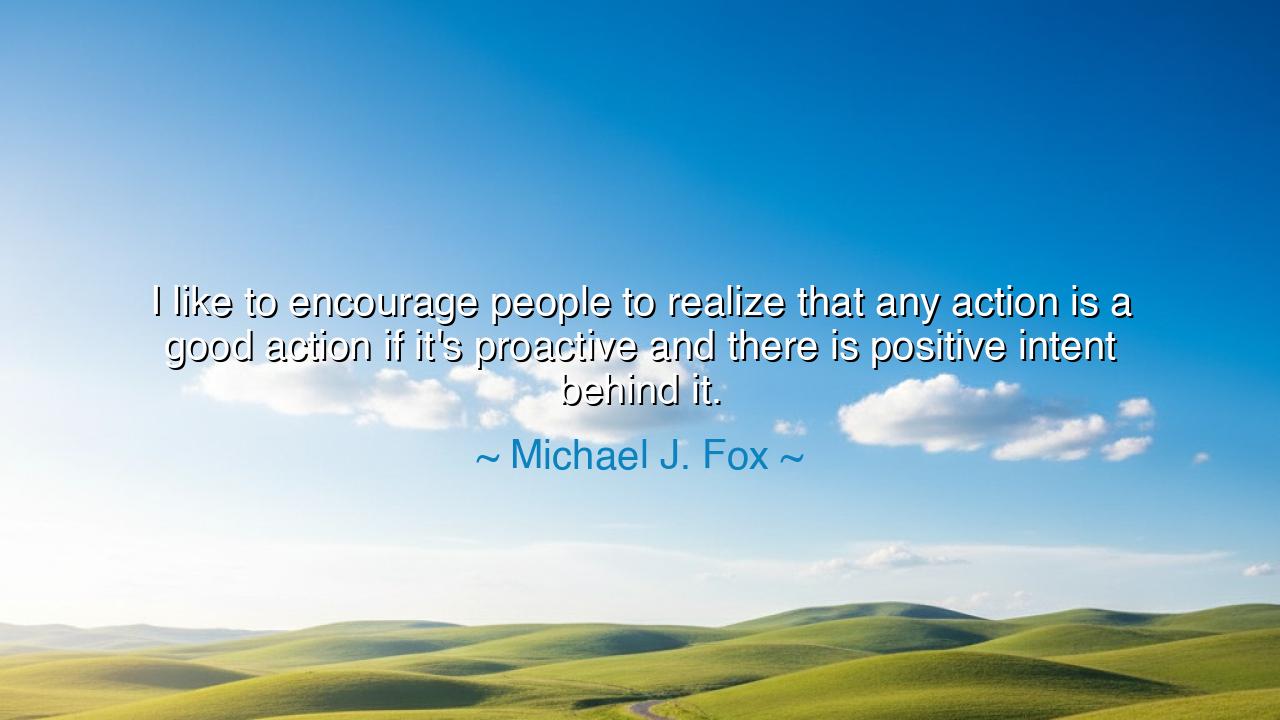
I like to encourage people to realize that any action is a good
I like to encourage people to realize that any action is a good action if it's proactive and there is positive intent behind it.






Hear, O children of courage, the words of Michael J. Fox, who declared: “I like to encourage people to realize that any action is a good action if it’s proactive and there is positive intent behind it.” These words come not from ease, but from a man who has walked through the valley of trial, living with Parkinson’s disease while refusing to surrender his spirit. His voice is a summons to act, to move forward, to do something—anything—that carries positive intent. For the greatest danger in life is not failure, but paralysis of the will, when fear and despair prevent the soul from taking even the smallest step.
The meaning of this saying lies in its emphasis on proactive action. To sit idle, lamenting fate, is to yield to weakness. To act, even imperfectly, is to breathe life into hope. Fox reminds us that no action born of goodwill is wasted. A kind word, a gesture of service, a small effort toward change—these may seem insignificant, yet they ripple outward, bringing light where there was none. Action with positive intent is seed sown in the soil of the world; though you may not see its fruit, it will surely grow.
The origin of these words is tied to Fox’s own journey. Diagnosed with a degenerative illness at the height of his career, he could have retreated into silence and bitterness. Instead, he chose proactivity: to advocate for research, to raise awareness, to inspire millions with his perseverance. His foundation became a beacon for those who suffered, and his example showed that action guided by hope, however small, is far more powerful than inaction shaped by fear.
Consider the story of Rosa Parks, who on a winter day in Montgomery chose a simple but courageous action: she refused to give up her bus seat. It was not a grand speech nor a mighty battle, but a proactive act born of positive intent—the pursuit of dignity and justice. That single action ignited a movement, stirred the conscience of a nation, and altered the course of history. Her life proves Fox’s words: any action, if rooted in courage and goodwill, is indeed a good action.
Think also of Jonas Salk, who worked tirelessly to create the polio vaccine. He did not wait for the perfect moment, nor did he stand idle in fear of failure. With positive intent, he acted, experimenting, refining, laboring through countless trials. The result was a gift to humanity that saved millions of lives. His story reminds us that bold, proactive steps, even when uncertain, are the path to progress.
O seekers of tomorrow, learn this: hesitation is the ally of despair, but action is the companion of hope. Do not wait until conditions are perfect, nor until fear has vanished. Move forward, even if trembling, so long as your intent is positive. For every action, however small, contributes to the greater good when it is guided by love, service, or faith. To act with goodwill is to participate in the shaping of a better world.
Practical wisdom calls you: when you see suffering, do not simply sigh—offer help. When injustice rises, do not merely complain—stand, speak, or march. When your own spirit falters, do not collapse into silence—take one step, however small, toward healing. Remember always that your action need not be perfect to be powerful; it need only be proactive and born of positive intent.
Thus, remember the teaching of Michael J. Fox: “Any action is a good action if it’s proactive and there is positive intent behind it.” Let this be your creed. Act, and let your action be a vessel of hope. Act, and let your action be the proof of your courage. Act, and let your action, however small, join the eternal current of love and justice. For the world is not moved by complaints or fears, but by the steady flame of those who dared to act with hearts set on the good.
––






TLTruong LeDoanNhat
This statement sparks curiosity about moral philosophy. Does the goodness of an action depend more on intent than outcome, and if so, how do we reconcile situations where positive intent leads to harm? I also wonder if this perspective encourages mindfulness and self-reflection, asking individuals to examine why they act and what they hope to achieve. Could fostering proactive, positively-intended actions cultivate more empathy and cooperation across diverse groups?
BLbaongoc luu
I appreciate the emphasis on positivity and initiative, yet it makes me question practical application. How can someone consistently ensure their proactive actions are genuinely helpful, especially when social, cultural, or ethical complexities come into play? I also consider whether this approach could encourage risk-taking or experimentation, knowing that positive intent frames the action as inherently good. How might this influence personal growth and community development?
VCLam Van Van cute
Reading this, I feel inspired but also cautious. It raises the question: can actions driven by positive intent ever be harmful if not carefully considered? I also wonder how much thought should go into evaluating the potential impact of proactive behavior. Does this idea encourage action over inaction even when outcomes are uncertain, or does it imply that the intention itself carries intrinsic value regardless of results?
MMr.Aline
This quote makes me think about the role of intention in our actions. Does proactive effort with positive intent always lead to good outcomes, or can well-meaning actions sometimes have unintended negative consequences? I also wonder how one balances intent with effectiveness—if an action is proactive but poorly executed, is it still ‘good’? Finally, how can this principle be applied in workplaces or communities to foster more constructive and positive behaviors?